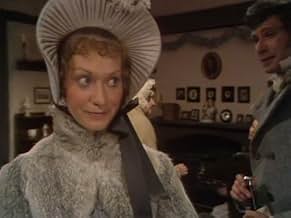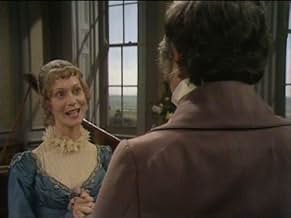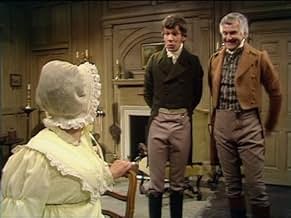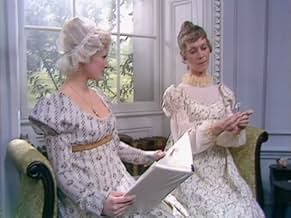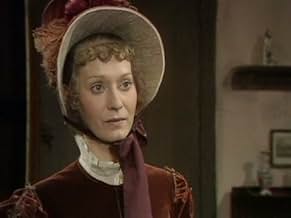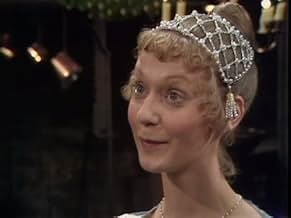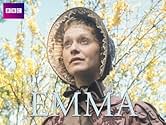Aggiungi una trama nella tua linguaWhile matchmaking for friends and neighbours, a young 19th Century Englishwoman nearly misses her own chance at love.While matchmaking for friends and neighbours, a young 19th Century Englishwoman nearly misses her own chance at love.While matchmaking for friends and neighbours, a young 19th Century Englishwoman nearly misses her own chance at love.
Sfoglia gli episodi
Recensioni in evidenza
The appealing nature of this adaptation is its length and its fun. Characterisaton comes close to the work Davies did in 1996 for A&E, although it differs somewhat. That might be down to the literary criticism of the day, though, and particularly in the judgment upon Harriet as a dull, stupid cow. Davies was a little more nuanced in his judgment upon all characters, but nonetheless, the work Denis Constanduros produced was very true to the spirit of the novel and made use of the comedy elements in the original text. Particularly in costume and the one character of Mr Woodhouse Constanduros produced classic comedy that was about words rather than one-liners and ridiculous situations.
Also the age-difference between Emma and her Mr Knightley is very much apparent. Knightley is not as vigorous as Mark Strong in the role, but this Mr Knightley has not the task of radiating sex-appeal, but rather radiating stability and wisdom through experience, like Austen's version.
Despite the lack of technology to make shots and filming on location truly possible, they did well. There is also no music which made it necessary for the actors and director to truly act and film the characters' feelings so the viewer could comprehend them. It is surprising how they managed to still convey the same emotional tension (or even more of it than they do now) through mainly just close-ups. That, though, might slightly bother the modern viewer. However, through it, viewers are compelled to use their own brain more than with modern adaptations of the novel.
Most of the contents is not toned down, only maybe the complicated business with Churchill and Jane when things are going wrong in the end. The main point of Emma and Knightley's blindness to each other stays upward better than in the Miramax version of 1996. And that without all that Miramx had to their disposal.
It is the only adaptation of the work as well, that uses the wordiness of Austen. It is important as a viewer that one listens more than that one watches. We could easily just make the adaptation in a hear-play, it would make little difference. The language is so expressive and the comedy is so much embedded in it that the physical acting matters less. And that is what Austen is about: it is no slapstick, but pure wordy wit. We have come a long way since the 1970s in comedy.
All in all, a satisfactory adaptation without sex-appeal, but with sweetness. I daresay, how Austen would have liked it.
Also the age-difference between Emma and her Mr Knightley is very much apparent. Knightley is not as vigorous as Mark Strong in the role, but this Mr Knightley has not the task of radiating sex-appeal, but rather radiating stability and wisdom through experience, like Austen's version.
Despite the lack of technology to make shots and filming on location truly possible, they did well. There is also no music which made it necessary for the actors and director to truly act and film the characters' feelings so the viewer could comprehend them. It is surprising how they managed to still convey the same emotional tension (or even more of it than they do now) through mainly just close-ups. That, though, might slightly bother the modern viewer. However, through it, viewers are compelled to use their own brain more than with modern adaptations of the novel.
Most of the contents is not toned down, only maybe the complicated business with Churchill and Jane when things are going wrong in the end. The main point of Emma and Knightley's blindness to each other stays upward better than in the Miramax version of 1996. And that without all that Miramx had to their disposal.
It is the only adaptation of the work as well, that uses the wordiness of Austen. It is important as a viewer that one listens more than that one watches. We could easily just make the adaptation in a hear-play, it would make little difference. The language is so expressive and the comedy is so much embedded in it that the physical acting matters less. And that is what Austen is about: it is no slapstick, but pure wordy wit. We have come a long way since the 1970s in comedy.
All in all, a satisfactory adaptation without sex-appeal, but with sweetness. I daresay, how Austen would have liked it.
I have rated this quite highly on two counts - one, the casting (largely forgotten names litter the cast including Doran Godwin as Emma, John Carson as Mr Knightley, Debbie Bowen as Harriet, Constance Chapman as Miss Bates, and Timothy Peters as Mr Elton) and two, an absorbing adaptation even if done in obviously studio (and rather cheap) sets.
Running at four hours plus, this version does more justice to the book than more cursory and recent attempts have been able to. Although both Emma and Knightley come across as a little older than they should be (21 and 39 I believe in the book), their growing understanding is believable, and you do find yourself hoping for that elusive happy ending.
What does mark it down is the annoying tune! Quick bit of trivia: Blackadder fans should note that Robert East, Prince Harry in the first series, is here as Frank Churchill.
Running at four hours plus, this version does more justice to the book than more cursory and recent attempts have been able to. Although both Emma and Knightley come across as a little older than they should be (21 and 39 I believe in the book), their growing understanding is believable, and you do find yourself hoping for that elusive happy ending.
What does mark it down is the annoying tune! Quick bit of trivia: Blackadder fans should note that Robert East, Prince Harry in the first series, is here as Frank Churchill.
Of the four film and TV miniseries productions available of Jane Austen's "Emma," this one is the second best. This and the 1996 independent film that stars Gwyneth Paltrow are the only two that bring out the best of the comedy and characters as Jane Austen wrote and saw them. The 1996 movie is superior. But this 1972 miniseries is very good in all aspects. The screenplay is very good, the casting is very good and the performances mostly are very good.
The cast for this BBC production was not one of big names in film. Some were more prominent on the stage, and others had short careers in film and/or TV. But, for their lack of notoriety, several gave fine performances. Doran Godwin was exceptional as Emma Woodhouse. Donald Eccles played Mr. Woodhouse to perfection – as one could see him coming right off the pages of Austen's novel. No one else has equaled that performance. It should be noted that this early miniseries gave considerable time to his character, where most later productions saved time by reducing his film time.
Debbie Bowen presents a more girlish picture of Harriet Smith than most renditions. That's not a negative, but it's worth noting where all other productions have a somewhat more adult or serious character, none of which are quite as attractive though. The rest of the cast of this series are good. At four hours, this TV series didn't add anything that the best film (1996 with Gwyneth Paltrow) might have missed, but it expanded some of the scenes and developed a couple of the characters a little more.
Very few people have rated this production. Even though it is a few decades back, it would be sure to please those who enjoy Jane Austen and any of the other productions of "Emma." And, for any who haven't yet seen the 1996 independent film with Gwyneth Paltrow, be sure to do so. It stands alone at the top of the class of "Emma" films.
The cast for this BBC production was not one of big names in film. Some were more prominent on the stage, and others had short careers in film and/or TV. But, for their lack of notoriety, several gave fine performances. Doran Godwin was exceptional as Emma Woodhouse. Donald Eccles played Mr. Woodhouse to perfection – as one could see him coming right off the pages of Austen's novel. No one else has equaled that performance. It should be noted that this early miniseries gave considerable time to his character, where most later productions saved time by reducing his film time.
Debbie Bowen presents a more girlish picture of Harriet Smith than most renditions. That's not a negative, but it's worth noting where all other productions have a somewhat more adult or serious character, none of which are quite as attractive though. The rest of the cast of this series are good. At four hours, this TV series didn't add anything that the best film (1996 with Gwyneth Paltrow) might have missed, but it expanded some of the scenes and developed a couple of the characters a little more.
Very few people have rated this production. Even though it is a few decades back, it would be sure to please those who enjoy Jane Austen and any of the other productions of "Emma." And, for any who haven't yet seen the 1996 independent film with Gwyneth Paltrow, be sure to do so. It stands alone at the top of the class of "Emma" films.
I haven't seen Kate Beckinsale's version in a while, but I do have fond memories of that and shall re-visit it soon. I did enjoy the Gwyneth Paltrow film though that's probably the least effective adaptation-wise, and while the 2009 series with Romola Garai had one or two scenes that didn't work I loved that one too. But I consider this Emma the best version. I too would've liked a few more outdoor scenes to have more of a glimpse of the outside world, and Debbie Bowen does play Harriet a little too broadly. However, it looks beautiful, the interiors more than made up for the lack of outdoor scenes and the scenery and costumes are likewise sumptuous with the photography not too stiff. The writing is thoughtful and witty, and the story is leisurely and gently told in a deliberate way and in spirit and in most details it is true to Jane Austen. Doran Godwin may be too old for the titular character, but what mattered more to me was how she interpreted the role, and I think she did a very good job with Austen's most multifaceted character. John Carson is the same as Knightley, but still turns in a likable performance. Mr Woodhouse is very funny and splendidly played by Donald Eccles(though I personally think Michael Gambon in the 2009 series was a tad more dimensional), while Ania Marsan, Robert East and Constance Chapman give the best Jane Fairfax, Frank Churchill and Miss Bates I've seen, great performances and their characters are very well developed. Overall, wonderful. 9/10 Bethany Cox
If you liked the book Emma by Jane Austen I do not think you will be disappointed with this dramatization. They did change a few things from the book but those who have not read the book will get most of the content. I particularly enjoyed the costumes. The gowns, hats and caps of the ladies were spectacular. The detail, even down to the ornate hat pins, helped make this a delight to watch. The characterizations were quite faithful for the most part. Mr.Woodhouse, while perhaps not quite the same as the book, was an interesting and quite funny character. This mini-series did a very good job of capturing a great deal of the humor of Jane Austen (she is incredibly funny!) which is not all that easy to translate from her elegant prose to the camera and dialog of video rendition. When I see something like this that is so well done it makes me appreciate anew this art form and especially that of script writing....not to mention blocking....editing.... I think the mini-series is friendlier to a good adaption of Jane Austen's novels rather than the movie. This is my favorite of those I have seen with the A & E 1996 version as a close 2nd and the 1996 movie as my least favorite. I have not seen 1948 & 1960 BBC versions - wonder where I can find them???
Lo sapevi?
- QuizThe actors playing husband and wife John and Isabella Knightley(Yves Tighe and Belinda Tighe)are brother and sister in real life.
- BlooperThe characters are seen playing cards with a modern deck of cards that show both the suit symbol (hearts, clubs, spades, clubs) and a number on each corner. During the time period the movie was set in, playing cards did not show the number of the card in the corners.
- ConnessioniFeatured in Funny Women: Mollie Sugden (1999)
- Colonne sonoreThe Twenty-ninth of May
Traditional
From John Playford's 'The English Dancing Master', First Edition (1651)
[theme]
I più visti
Accedi per valutare e creare un elenco di titoli salvati per ottenere consigli personalizzati
- How many seasons does Emma have?Powered by Alexa
Dettagli
- Data di uscita
- Paese di origine
- Lingua
- Celebre anche come
- Эмма
- Luoghi delle riprese
- Uppark House, South Harting, West Sussex, Inghilterra, Regno Unito(Exteriors of Hartfield, Emma's home)
- Azienda produttrice
- Vedi altri crediti dell’azienda su IMDbPro
Contribuisci a questa pagina
Suggerisci una modifica o aggiungi i contenuti mancanti


